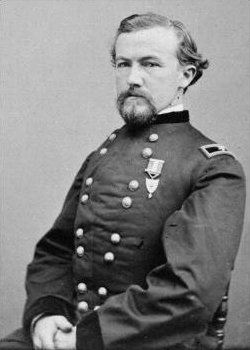Charles Ewing (general) facts for kids
Quick facts for kids
Charles Ewing
|
|
|---|---|

General Charles Ewing
|
|
| Born | March 6, 1835 Lancaster, Ohio |
| Died | June 20, 1883 (aged 48) Washington, D.C. |
| Place of burial | |
| Allegiance | United States of America Union |
| Service/ |
United States Army Union Army |
| Years of service | 1861 – 1867 |
| Rank | |
| Battles/wars | American Civil War *Battle of Shiloh *Battle of Vicksburg *Atlanta Campaign *Battle of Bentonville |
| Other work | Lawyer |
Charles Ewing (born March 6, 1835 – died June 20, 1883) was an important person during the American Civil War. He was a lawyer and a general in the Union Army.
Charles Ewing came from a famous family. His father, Thomas Ewing, was a government official. His brothers, Thomas Ewing Jr. and Hugh Boyle Ewing, also became important figures. He was also connected to William Tecumseh Sherman, a very famous general. Sherman was both his foster brother and his brother-in-law.
Contents
Early Life and Education
Charles Ewing grew up in Ohio. He went to college at St. Joseph's College and then at the University of Virginia. After college, he decided to study law.
He became a lawyer and started his career in St. Louis, Missouri. He was working there when the American Civil War began.
Serving in the Civil War
When the Civil War started, Charles Ewing joined the U.S. Army. In May 1861, he became a captain. He joined the 13th Infantry, where his brother-in-law, William T. Sherman, was a colonel.
Ewing later became an inspector-general on General Sherman's staff. This meant he helped Sherman check on the army's readiness and operations.
Brave Actions in Battle
Charles Ewing was known for his bravery in battle. During the Siege of Vicksburg, he showed great courage. He was one of the first to place his battalion's flag on the enemy's fort. During this brave act, he was badly wounded.
For his actions at Vicksburg, he received a special honor in 1863. He was "brevetted" major. This means he was given a higher rank as a special recognition for his bravery, even if it wasn't a permanent promotion yet.
He continued to show courage in other battles. For his actions in the Atlanta Campaign, he was brevetted lieutenant-colonel in 1864. He also showed great leadership during Sherman's "March to the Sea" and through the Carolinas. For this, he was brevetted colonel in 1865.
On March 8, 1865, he was made a brigadier general of volunteers. This was a significant achievement for his service.
Life After the War
After the Civil War ended, General Ewing left the army in 1867. He moved to Washington, D.C. and started a successful law practice there.
Helping Native Americans
In 1874, Charles Ewing took on an important new role. He became the Catholic Commissioner for Indian Missions. This organization later became known as the Bureau of Catholic Indian Missions. In this role, he worked to protect the interests of Roman Catholic missions. He also defended the rights of Native American people.
At the time, the U.S. government was deciding which religious groups could run schools on Native American lands. The Catholic Church had many schools already. However, President Ulysses S. Grant's administration allowed them to operate only a few. Ewing worked to make sure the Catholic Church could continue its important work.
Charles Ewing served as the Catholic Commissioner until he passed away. He died in Washington, D.C., on June 20, 1883.
 | Leon Lynch |
 | Milton P. Webster |
 | Ferdinand Smith |

